

Writing Sites. 25 Things Every Writer Should Know. An alternate title for this post might be, “Things I Think About Writing,” which is to say, these are random snidbits (snippets + tidbits) of beliefs I hold about what it takes to be a writer.

I hesitate to say that any of this is exactly Zen (oh how often we as a culture misuse the term “Zen” — like, “Whoa, that tapestry is so cool, it’s really Zen“), but it certainly favors a sharper, shorter style than the blathering wordsplosions I tend to rely on in my day-to-day writing posts. Anyway. Peruse these. Absorb them into your body. Let your colonic flora digest them and feed them through your bloodstream to the little goblin-man that pilots you.
Feel free to disagree with any of these; these are not immutable laws. Buckle up. How to Write a Screenplay. In this installment of A Writer’s Voice we’re going to be looking at Blue Ruin, a nice little indie thriller by Jeremy Saulnier.
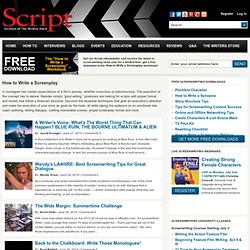
What’s interesting about Blue Ruin is that its main character, Dwight, does not arc in the traditional way. He doesn’t change in the way that screenplay characters typically change. In fact, the primary journey of Blue Ruin is built around... As a producer and script consultant who reads hundreds of screenplays, one of the most common weaknesses in the majority of scripts I review has to do with dialogue that is expositional, or what we call “on the nose” — where characters state exactly what they are thinking and feeling, or tell us information... With June now safely behind us, the 2013-2014 school year is officially over.
Story Starters, Creative Writing Ideas for Fiction. Looking for story starters and creative writing ideas?
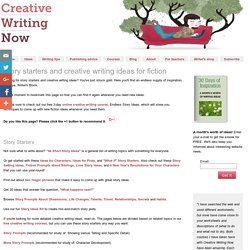
You've just struck gold. Here you'll find an endless supply of inspiration. Bye-bye, Writer's Block. Take a moment to bookmark this page so that you can find it again whenever you need new ideas. Also be sure to check out our free 3-day online creative writing course, Endless Story Ideas, which will show you techniques to come up with new fiction ideas whenever you need them. Shady Characters. Writing Quality. Writing.org - Advice for Freelance Writers. Are You Really a Writer ... Or Just a Copyist? Beyond Your Blog: Freelancing, Getting Paid to Write, and Writing for Free. If you’d like, jump to a section within this post: Many of you are growing as writers and seek opportunities beyond your blog.
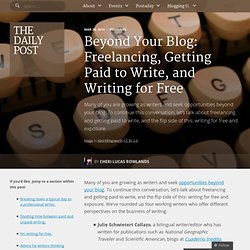
To continue this conversation, let’s talk about freelancing and getting paid to write, and the flip side of this: writing for free and exposure. We’ve rounded up four working writers who offer different perspectives on the business of writing: Julie Schwietert Collazo, a bilingual writer/editor who has written for publications such as National Geographic Traveler and Scientific American, blogs at Cuaderno Inedito.Caitlin Kelly, a National Magazine Award winner and frequent contributor to the New York Times, blogs at Broadside.Kristen Hansen Brakeman, a writer who has contributed to the Washington Post and the New York Times‘ Motherlode, blogs at KristenBrakeman.com.Deborah Lee Luskin, an award-winning novelist and radio commentator, blogs at Live to Write — Write to Live: a collaborative blog for the New Hampshire Writers’ Network.
How To Become a Professional Blogger. First of all, What is a pro blogger?

Good question. For the purpose of this tutorial, we’ll describe a professional blogger as someone who makes their living by blogging. Of course, there are lots of ways to make money blogging, but that is another topic. For many, it is a dream job. Take some photos, write a few posts and make a living. Because it can take a while for a new blog to get established, many bloggers look for paid blogging jobs. 7 Steps to Being a Professional Blogger: 1. Your niche is important. What if you are already blogging? 2. This goes without saying. Many full time bloggers run 2, 3 or more blogs. 13 Browser-Based Tools For Writers. Portability and accessibility are important for writers.

You never know when inspiration will hit, and when it does you don’t want to be caught off guard. Professional software suites can be nice but often times are overkill, localized, and more hassle than they’re worth. Browser-based writing tools are available no matter where you go. 500 Storyboard Tutorials & Resources. Once the script is written – how do you effective communicate the visual direction of your film?
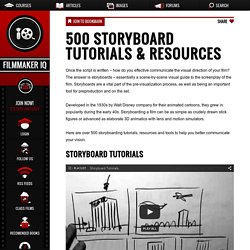
The answer is storyboards – essentially a scene-by-scene visual guide to the screenplay of the film. Storyboards are a vital part of the pre-visualization process, as well as being an important tool for preproduction and on the set. Developed in the 1930s by Walt Disney company for their animated cartoons, they grew in popularity during the early 40s. Storyboarding a film can be as simple as crudely drawn stick figures or advanced as elaborate 3D animatics with lens and motion simulators. The 22 rules of storytelling, according to Pixar. The Creative Penn Blog: Helping you write, publish and market your book. The last few days at London Book Fair have been mind-blowing for me.
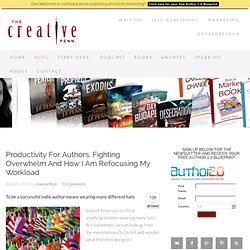
I feel this is a tipping point in my own author journey, and in this post I share with you what I have learned. (1) Ambitious authors can achieve 7 figure success as indies. Storyboard 75: The big book of narrative. Famous Advice on Writing: The Collected Wisdom of Great Writers. 25 Insights on Becoming a Better Writer. When George Plimpton asked Ernest Hemingway what the best training for an aspiring writer would be in a 1954 interview, Hem replied, “Let’s say that he should go out and hang himself because he finds that writing well is impossibly difficult.
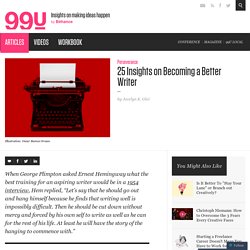
Then he should be cut down without mercy and forced by his own self to write as well as he can for the rest of his life. At least he will have the story of the hanging to commence with.” Today, writing well is more important than ever. Your Guide To Self Publishing. Table Of Contents §1 – Can Self-Publishing Make Your Book a Reality?
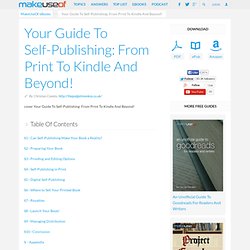
§2 – Preparing Your Book §3 – Proofing and Editing Options §4 – Self-Publishing in Print §5 – Digital Self-Publishing. Kurt Vonnegut’s 8 Tips on How to Write a Great Story. By Maria Popova The year of reading more and writing better is well underway with writing advice the likes of David Ogilvy’s 10 no-bullshit tips, Henry Miller’s 11 commandments, Jack Kerouac’s 30 beliefs and techniques, John Steinbeck’s 6 pointers, and various invaluable insight from other great writers.